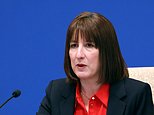As rumours fly of a coup in Damascus, fuelled by the reticence of President Bashar al-Assad to appear on TV, many are speculating about the fall of the ‘butcher’ of Syria.
Uncertainty about his whereabouts and his failure to speak to his people contrasts sharply with the use of the media by Abu Mohammad al-Julani, the Muslim fanatic whose balaclava-clad fighters have overrun the country’s biggest city.
President Assad’s strange silence since he flew to Moscow to visit his staunch ally, Vladimir Putin, has many of his enemies excited that he might have sought sanctuary there rather than return to Syria.
It would be a meek ending for a dictator who has spilled so much blood trying to wrestle his country from Syrian rebel groups, Kurdish fighters and Islamic fundamentalists like Isis and Al-Qaeda.
He and his Russian patrons – who have naval and air bases on the Syrian coast – all but levelled Aleppo in 2017. And now Sukhoi jets are terrorising the people of that city yet again, as Russia will not baulk at high civilian casualties to protect its assets.
But it prizes stability, and Assad represents that, so if the president has thrown in the towel it would not be at Moscow’s behest.
More likely, Assad is planning a counter-attack. He has been on the back foot before and has weathered many a crisis, so will feel confident that this insurrection can be crushed as those before have.
Rumours of Assad's demise, no doubt promoted by his enemies, will be demoralising to the Syrian regime, but he has always managed to pull himself back from the brink. Indeed he may already have delivered a final message to al-Julani.




Another option would be for Assad to consolidate his powerbase on the north-west coast of Syria where Russian bases are located.
Whether he stays and fights or flees, leaving a power vacuum in Damascus, civil war is something that will affect us all.
During the last one, in which Islamist fundamentalists overran large swathes of Syria, the UK suffered some of the worst terrorist outrages in recent history.
In 2013, soldier Lee Rigby was murdered by two extremists. Four pedestrians were killed when Khalid Masood mowed them down with his car on Westminster Bridge before he stabbed to death police officer Keith Palmer in 2017. Three months later, three Islamists drove a van into crowds on London Bridge before stabbing shoppers in Borough Market.
Then, as part of an international coalition, UK forces had been bombing Isis terrorists
in Syria and Iraq to rid the region of the so-called Caliphate. The conflict radicalised Islamists here to commit heinous crimes.
A chill will creep down the spines of us all at the prospect of a new era of extremism.
The civil war in Syria also caused some five million people to flee the country, many of whom headed to Western Europe.
We are next to powerless to prevent another immigration crisis.



The situation in Syria is even more complex and dangerous than before.
Motivated by a hatred of the Alawite Syrian regime, this new Sunni group, Hayat Tahrir al-Sham – an offshoot of Al-Qaeda – seems to have captured Aleppo as a stepping stone to overthrowing Assad.
Turkish forces could fall in behind them, as fellow Sunnis who hate the powerful Kurdish minority straddling the Syrian-Turkish border.
All these factions inside Syria are baffling and either side’s victory will be bad news for the West, but do we have the forces and the will to stand between these mad dogs?
- Mark Almond is director of the Crisis Research Institute, Oxford












